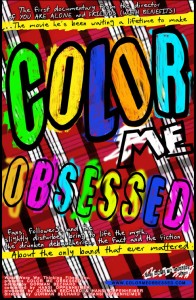 It seemed like an impossible task: Can you tell the story of a band without interviewing any of its members or using any of its music? If you’re Gorman Bechard, the writer/director/producer of Color Me Obsessed: A Film About The Replacements, the answer is a resounding “yes.”
It seemed like an impossible task: Can you tell the story of a band without interviewing any of its members or using any of its music? If you’re Gorman Bechard, the writer/director/producer of Color Me Obsessed: A Film About The Replacements, the answer is a resounding “yes.”
As Bechard described when Jeff Giles and I interviewed him on the most recent Popdose Podcast, The Replacements thumbed their noses at convention at every turn of their career, so why not make a documentary that reflects that? And given how the surviving members of the band haven’t been too willing to bring up the past, it doesn’t make sense to try to drag it out of them. Besides, anybody interested in seeing this is probably familiar enough with The ‘Mats so that, when they talk about, say, “I Will Dare,” those opening chords will start ringing in your head without having to hear it on the soundtrack.
Instead, Bechard (and Hansi Oppenheimer, from whom he inherited the production) assembled over 100 people to talk about The Replacements. These range from established critics to ordinary fans, with plenty of musicians and celebrities thrown in (see the trailer below for but a few of the people you may recognize).
The movie begins with the Mats as one of many post-punk bands in the rising Minneapolis scene of the early-80s. They get their demo into the hands of local music guru Peter Jesperson (who was also not interviewed for the film), who promptly signs them to his Twin/Tone Records label and manages them for most of their career. After three brilliant albums and an EP on Twin/Tone, they sign with Sire Records.
The beauty of The Replacements was that, on any given night, they were either the best or the worst band in the world. The first half of Color Me Obsessed leans towards the latter, with plenty of hilarious tales of onstage drunkenness centering mostly on the antics of guitarist Bob Stinson, whose penchant for wearing tutus and/or standing in garbage cans became the stuff of legend. Bechard even tracked down the guy who caused Stinson to famously miss the first three songs of a gig in Trenton, NJ in 1985 because Bob refused to end their pinball game.
But their famously sloppy concerts only tell one side of the band’s story, and just as you think you’re not getting the other, the movie switches to the appeal of frontman Paul Westerberg’s gorgeously painful songs. Writer Robert Voedisch talks about how their music comforted him while growing up alone on a farm to the point where he imagined that bassist Tommy Stinson was his older brother. It was alternately hysterical and heartbreaking. In other words, the entire Replacements catalog in a nutshell.
Bechard’s masterstroke was in using Voedisch intermittently in the first half so that we could already develop a relationship with him by the time he opened up. Without the earlier segments, Voedsich could have been dismissed as a nutjob. Instead, we became invested in his story. As he talked, I thought about my own obsession with The Replacements when I was in my early-to-mid-20s and knew exactly how he felt. I wanted to jump out of my seat, run up to the screen, and give Voedisch a hug.
But the rise of Westerberg as his decade’s greatest chronicler of angst coincided with the demise of the band. Bob Stinson was fired after their major label debut, 1985’s Tim, due to his substance abuse problems. The decision effectively ended the band, even though they carried on for three more albums and 1987’s Pleased To Meet Me is considered one of their best. Not even a minor hit with ”I’ll Be You” in 1989 could keep the band from imploding two years later.
Each new album is chaptered with on-screen text listing the songs, how many copies it sold (both on original release and the 2008 reissues) and in comparison with the biggest-selling album of that year, and the grade Robert Christgau gave it in the Village Voice. Christgau was interviewed heavily for the film and, in his typical manner, he provides the phrase that best describes the magic of The Replacements, ”controlled chaos.”
The film works without their input because Bechard’s love for the group is so apparent that I never felt like I needed to hear their side of the story. And by not using their music, the movie, as Jeff pointed out in our interview, is as much about fandom as about The Replacements. So even if you’ve never bought into the cult of the Mats but you have a group that you’ve cranked up to ear-splitting levels in a dark room to help you deal with your pain, you’ll see elements of yourself in here.




Comments